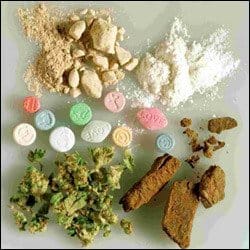
Illegal Drugs In St. Kitts – Nevis
Basseterre, St. Kitts – Nevis
March 27, 2012 (CUOPM)
St. Kitts and Nevis‘ Prime Minister the Right Hon. Dr. Denzil L. Douglas said Tuesday that the efforts of his twin-island Federation in the fight against drugs would be given the greatest chances for success if other nations were to find ways to curb the demand for drugs within their own borders, and control the ease with which weapons can be bought and sent overseas as well.
However Dr. Douglas said that he is heartened and encouraged with the commitment of other countries to help fight crime in the Caribbean.
Speaking at the opening ceremony of the Preliminary International Drug Enforcement Commanders Conference and the 18th Annual Regional Drug Commanders Meeting tat the St. Kitts Marriott Resort, Dr. Douglas said the commitments were made at last week’s Council of Ministers of the Regional Security System (RSS) in St. Vincent and the Grenadines.
“We came away very heartened and encouraged when we received commitments from the Governments of the United States of America, the Republic of France and Canada to work with us in several ways to fight trans-national crime in our region,” said Prime Minister Douglas, who added that the conference is so important and underscores the need for the follow-on session in Indonesia.
Dr. Douglas referred to the writings of Oriana Zwill and Lowell Bergman of what has happened in recent years “Globalization hit organized crime over the last decade”, they state, “and now is integral to its most profitable business — the international narcotics traffic. Once a regional problem involving a customer base of a few million, and barely a billion dollars in sales, the illegal drug industry is now a worldwide enterprise with tens of millions of hard core consumers spending hundreds of billions on opiates, cocaine, amphetamines and marijuana, as well as other drugs.”
Dr. Douglas said that the challenge that the region faces as policy makers and law enforcement officials is further complicated by the fact that heroin, cocaine, marijuana, synthetic drugs and other substances produced in one region are sold in another at utterly phenomenal markups.
“This then places transnational criminals in control massive cash reserves that enable them to function along the lines of the traditional corporate structure ““ but marked by relentless ruses to mix illegitimately acquired funds with legitimately acquired assets, in an attempt to render the ill-gotten gains untraceable. In addition, in real terms, illegal narcotics are cheaper now than they were 20 year ago,” said Dr. Douglas.
He pointed out that the United States remains the number one consumer of illegal drugs.
“Considering our geographical position, this is most unfortunate for us here in the Caribbean. At the same time, drug use in Europe is expanding, making that region a close second to the U.S. Traditionally rare in West Africa, the drug trade, in recent years, has become a real challenge. The illegal drug trade is alive and well in Eastern Europe. It has its adherents in China, Malaysia, Myanmar, Singapore, Vietnam. In a nutshell, some 272 million people around the globe use illegal drugs,” said Prime Minister Douglas, who pointed out that it is the reality with which the region must grapple.
He said even though the focus this week is the Caribbean, the fact is that an expanding drug trade ““ globally – places every country, including the region’s, at greater risk because of the transnational character of these the global drug trade.
“The corrosive impact of the drug trade is well-established. When narco-business persons enter a legitimate economic space, legitimate business people find it impossible to compete. For example, the former must seek bank loans and repay these loans with interest. The narco “business person”, however, is able to act as his or her own bank,” said Prime Minister Douglas.
He told the drug commanders that drug-related operators constitute a drain on the state in which they function since they tend to create systems that are outside of formal channels.
“To pay no taxes they cause a rise in criminal activity, arm criminal and other unsavory groups, and generally create societal fear and destabilization. Indeed, there are some countries outside of the Caribbean in which the drug-related violence is reported to rival that of Afghanistan. This is a cause for great concern,” said Prime Minister Douglas, who pointed out that there is the deeply troubling point-of-origin matter where the weapons that are used by drug traffickers and other criminals in this hemisphere is concerned.
“My regional colleagues and I have raised this point on several occasions and I will not belabor the point now, but this remains a major concern because everything, as I have said, is interconnected,” said Prime Minister Douglas.
He said that the efforts of countries like St. Kitts and Nevis would be given the greatest chances for success if other nations were to find ways to “curb the demand for drugs within their own borders, and control the ease with which weapons can be bought and sent overseas as well.”
He disclosed that in 2011 and 2012 local security forces seized cocaine with a street value of EC$500,000, cured marijuana with a street value of some EC$12 million and marijuana plants with a street value of some EC$42 million.
“I shall be following very closely all that emanates from this conference, this week, confident that, together, we shall sharpen and refine our approaches to the twin challenges of drugs and transnational crime; and confident, also, that together we shall help to promote the stability, both of our respective nations, and, in doing so, the world,” said Prime Minister Douglas.
Countries represented are Antigua and Barbuda, Aruba, Barbados, Bonaire, The Bahamas, Colombia, Curacao, Dominica, Grenada, Guyana, Haiti, Jamaica, Martinique, St. Kitts and Nevis, St. Lucia, St. Maarten, St. Vincent and the Grenadines, Trinidad and Tobago, the Turks and Caicos Islands, St. Croix and the United States.